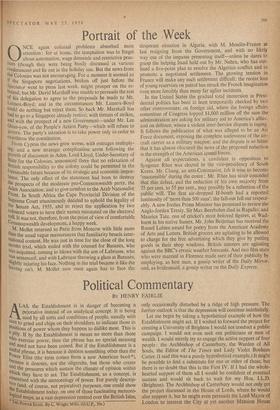Portrait of the Week
0 NCE again colonial problems absorbed most attention : for at home, the temptation was to forget about automation, wage demands and restrictive prac- tices (though they were being busily discussed at various conferences) and lie out in the holiday sun. But the news from the Colonies was not encouraging. For a moment it seemed as if the Singapore negotiations, broken off just before the 8Pec1ator went to press last week, might prosper on the re- bound; but Mr. David Marshall was unable to persuade the rest °, t his delegation to agree to the proposals he made to Mr. Lennox-Boyd; and in the circumstances Mr. Lennox-Boyd could do nothing but reject them. So back Mr. Marshall has had to go to a Singapore already restive; with threats of strikes, nod with the prospect of a new Government—under Mr. Lee Quan-yew, of the People's Action Party—which will refuse to govern. The party's intention is to take power only in-order to overthrow the constitution.
From Cyprus the news grew worse, with outrages multiply- ing; and a new strategic complication arose following the growth of discontent in Aden. Lord Lloyd, Under-Secretary of State for the Colonies, announced there that no relaxation of British responsibility to the colony could be permitted in the foreseeable future because of its strategic and economic impor- tance. nee. The only effect of the statement had been to destroy lilt prospects of the moderate pro-Commonwealth party, the Aden Association; and to give comfort to the Arab Nationalist Pront. In South Africa the Cape Provincial Division of the Supreme Court unanimously decided to uphold the legality of tile Senate Act, 1955, and to reject the application by two coloured voters to have their names reinstated on the electoral Mt It was not, therefore, from the point of view of comfortable Commonwealth development, a happy week. „ M. Monet returned to Paris from Moscow with little more 'flan the usual vague reassurances that familiarity breeds inter- national content. He was just in time for the close of the long secrets trial, which ended with the counsel for Baranes, who Was acquitted, coming to blows with the son of Labrusse, who w,as sentenced; and with Labrusse throwing a glass at Baranes, 81'ightly injuring his face. Nothing in the trial became it like the caving on't. M. Mollet now once again has to face the i desperate situation in Algeria, with M. Mendes-France at last resigning from the Government, and with no likely way out of the impasse presenting itself—unless he dares to grasp the helping hand held out by Mr. Nehru, who has out- lined a five-point plan to resolve the Algerian conflict and to promote a negotiated settlement. The growing tension in France will make any such settlement difficult; the recent loss of young reservists on patrol has struck the French imagination even more forcibly than many far uglier incidents.
In the United States the gradual total immersion in Presi- dential politics has been at least temporarily checked by two other controversies; on foreign aid, where the foreign affairs committee of Congress lopped $1,000 million off the sum the administration are asking for military aid to America's allies; and on defence, where a violent inter-Service dispute is raging. It follows the publication of what was alleged to be an Air Force document, exposing the complete uselessness of the air- craft carrier as a military weapon; and the dispute is so bitter that it has almost obscured the news of the proposed reduction in the strength of the American armed forces.
Against all expectations. a candidate in opposition to Syngman Rhee was elected to the vice-presidency of South Korea. Mr. Chang, an anti-Communist, felt it wise to become `inaccessible' during the count: Mr. Rhee has since conceded that this defeat, and the reduction of his own majority from 75 per cent. to 55 per cent., may possibly be a reflection of the public will. The first air-dropped H-bomb had a reported luminosity of 'more than 500 suns': the fall-out fell out respect- ably. A new Jordan Prime Minister has promised to review the Anglo-Jordan Treaty. Sir Max Beerbohm died in Rapallo; and Maurice Tate. one of cricket's most beloved figures, at Wad- hurst in his native Sussex. Mr. John Betjeman has received the Russel Loines award fir poetry from the American Academy of Arts and Letters. British grocers are agitating to be allowed to charge for the free advertising which they -give by putting goods in their shop windows. British caterers are agitating against the BBC's erratic weather forecasts. And two film stars who were married in Florence made sure of their publicity by employing, as best man, a gossip writer of the Daily Mirror, and, as bridesmaid, a gossip writer on the Daily Express.










































 Previous page
Previous page